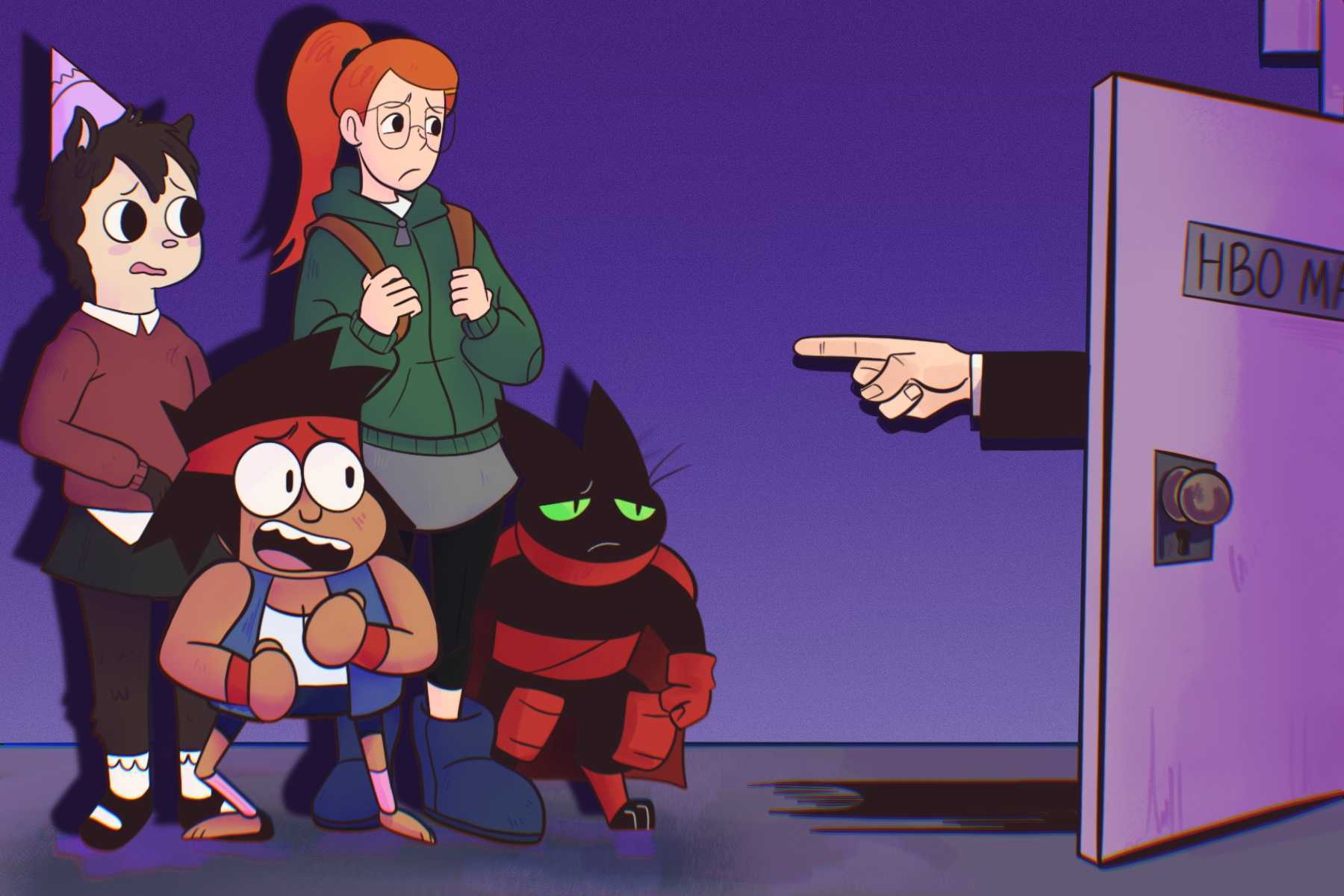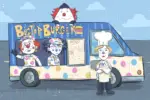Animators can’t seem to catch a break these days. First Netflix with its canceled projects, and now HBO Max with its content cuts. For a long time, animators believed the streaming service to be a safe haven for artistic expression and long-lasting exposure, but now it seems they’ll have to go someplace else (if there is one). Next to shelving finished films and laying off workers, the cutting of animated content is just another unfavorable gesture made by David Zaslav. Zaslav, the CEO of Warner Bros. Discovery, hopes the cut content will save HBO Max $3 billion before it merges with Discovery Plus.
“OK K.O! Let’s Be Heroes!,” “Mao Mao, Heroes Of Pure Heart,” “Uncle Grandpa,” “Close Enough” — up to 40 animated shows met a swift end under Zaslav’s orders. One cut show that notably received widespread attention, “Infinity Train,” was about a girl riding a mysterious train whose cars house a multitude of worlds. “Infinity Train” was a critical smash and was beloved by fans of all ages for its emotional storytelling, intriguing world and beautiful animation. HBO Max, however, decided such a show was not worthy of its catalog and chucked it. Owen Dennis, the creator of “Infinity Train,” explained in great detail the chaos and confusion surrounding HBO’s cuts via Substack. According to him, Warner Bros. claimed they removed “infrequently watched” programs but never provided statistical proof to anyone. He also stated that the higher-ups responsible for the cuts did not inform their executives beforehand, keeping them from telling the creators at an appropriate time.
Unfinished projects were not safe from the cuts either, including some highly anticipated ones. A collaboration between Cartoon Network and HBO Max was canceled just three months after its announcement. Named “Driftwood,” this film would’ve followed Clover, a mouse-like creature living in a world dominated by Overlord Thorn, the ruler of a powerful corporation. His only hope lies in Driftwood, a city where life is free, and he, along with his friends Caspia and Marigold, embarks on a space-faring journey to find it. Thorn, on the other hand, hopes to destroy both Clover and Driftwood to maintain his power. With an exciting premise like this, it seemed “Driftwood” was poised for easy success. Now the only evidence of its existence is a single poster.
A new Batman series, “Batman: The Caped Crusader,” also met an early end. Headed by J.J. Abrams and Bruce Timm, the man behind the highly-esteemed “Batman: The Animated Series,” this promising new series would’ve provided longtime fans (and new ones) with “sophisticated storytelling, nuanced characters, and intense action sequences all set in a visually striking world.” You’d think Warner Bros. would spare a show like this because of their longtime affiliation with DC, but now it seems they’ve picked which shows to cancel with blindfolds over their eyes. Fortunately, fans need not remain embittered for long: Streaming services like Netflix may possibly pick up the series.
Other canceled projects include several Looney Tunes films, a Batman Christmas special and an “Amazing World of Gumball” movie.
And what do animation fans and creators have to say about all this?
“Imagine pouring everything into a project and a new CEO wipes it from existence just so he doesn’t have to pay you the meager residuals that reward you for that work. Then, just to twist the knife, deletes all evidence your show ever existed from the internet.” — Ryan Estrada (@ryanestrada).
“Cool, love to work on something for literal years and then have it totally vanish, it’s extremely good that TV writing has become building sand castles at high tide.” — Aaron Burdette (@AaronBurdette).
“Not only are artists underpaid—they spend days, nights + weekends putting their heart + souls into these projects—only to have them erased from existence?” — Michael Rianda (@michaelrianda).
A few responses were specifically targeted at Zaslav.
“I’d love to see David Zaslav try to animate a shot, draw a background, create a model sheet, color in a character, or coordinate an animated project. Idk maybe you should personally experience the blood, sweat, and tears of creating art before making others throw theirs away.” — Kevin Temmer (@KevinTemmer).
But all is not lost for these shows, at least not yet. Services such as YouTube, iTunes (where “Infinity Train” is seeing high ratings), and Amazon Prime still hold onto many beloved shows, but it’s only a matter of time. What worries creators most is that, with the power to simply delete shows from existence with the simple click of a button, years of hard work will go down the drain in the blink of an eye, and people won’t get an opportunity to enjoy them. And since many of these shows do not have physical releases, their work might become even more difficult, if not totally impossible, to watch.
Warner Bros. has responded to all the complaints and anger by simply pretending these shows don’t exist at all, or at least that’s what it looks like. As Dennis states on his Substack page, all traces of the cut shows have been purged from HBO’s social media accounts. Most likely, this was due to HBO’s library purging the cut shows (Why would you have a trailer for a show/movie you don’t have?), but if Netflix’s YouTube channel can still hold onto a video for “Marvel’s Defenders” (despite Netflix no longer supporting the show), why would HBO delete the content for “Infinity Train”? Also, it’s kind of suspicious to see HBO clean house so hastily. It’s almost as if they were trying to make people forget they were even there and to keep potential viewers from finding them too soon.
How will viewers be able to watch their favorite shows now? Some will turn to iTunes and Amazon Prime, but others — the ones who might not be able to pay for subscriptions — may resort to more radical methods such as piracy. Regarding that issue, Dennis says it’s up to viewers to decide. On one hand, pirating doesn’t allow creators to earn the payment they need to keep a roof over their heads and food on their tables. On the other, pirating allows people to experience art that’s no longer available to them, and it allows them to actually keep a piece of art without having to worry about it vanishing. To Dennis, art encapsulates our culture and history, and to pirate art for the sake of enjoyment and personal possession would be, as he states, “preservation of our history.”
Of course, there are those who argue these cuts are simply the result of business, nothing more, and that people are overreacting. While part of this is true, the poor communication between Warner Bros. and the creators cannot be denied. Had everything flowed more smoothly, the angry blowback might’ve been less severe. And consider this: If low viewership was the reason for these cuts, the higher-ups should’ve been upfront about it instead of hiding any viable evidence. In his post, Dennis states how “Infinity Train” is in “the 91st percentile in children’s media,” giving the impression that low viewership might not have been the reason. The claim might’ve been a ruse to placate the creators, just like the claim that their shows will survive on other platforms. And the fact that animated content largely received the short end of the stick suggests that Zaslav only sees animation — animation that has moved, inspired and entertained legions of audiences — as a disposable asset, something that entertains small children and will be forgotten within the next hour, something that’s as easily made as a frozen dinner. As one article puts it, “They’re just cartoons, after all; the company can always pump out more if it ever decides to get back into the business of entertaining kids a few more mergers down the line. These things make themselves, right?”
HBO Max has over 78 million subscribers. While it’s still leagues away from reaching Netflix numbers, it’s still very popular. With such a large number of people all gathered in one place, creators can reach wider audiences faster and receive their well-earned recognition. These cuts are a deep knife in the chest of longtime fans of these shows, newer ones just starting them, and, of course, the talented creators behind them who want their stories told. This is but another example of what happens when art lives to serve the whims of business — a business that requires creators to follow the rules to a tee for payment, a business that can radically alter a show’s presentation to please certain groups, a business that can toss art away in the name of a few extra dollars.
And speaking of dollars, in his effort to save $3 billion, Zaslav wound up losing Warner Bros. Discovery $20 billion in market cap. So, if you’re looking for some karma, there it is. Perhaps this loss will convince Warner Bros. to alter their decision-making and reconsider how they treat creators, but for now, this hope is only that: a hope.
If you wish to support your favorite creators, simply follow Dennis’ advice, which is to watch their shows on other available platforms. Encouraging others to watch these shows online can also help, along with voicing support for these creators. Even just giving creators a follow on social media can help.















